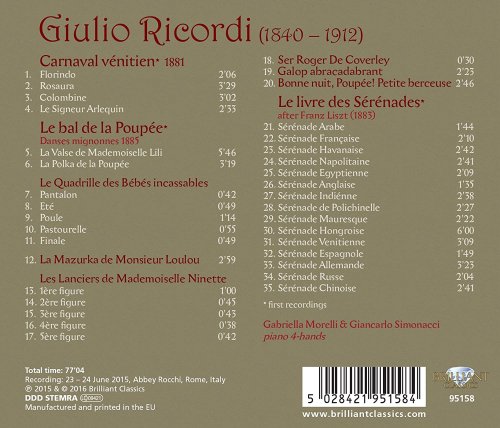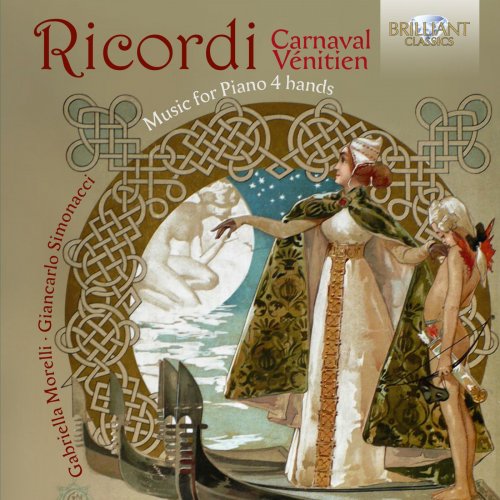
Gabriella Morelli & Giancarlo Simonacci - Ricordi: Carnaval Vénitien Music for Piano 4 Hands (2016)
BAND/ARTIST: Gabriella Morelli, Giancarlo Simonacci
- Title: Ricordi: Carnaval Vénitien Music for Piano 4 Hands
- Year Of Release: 2016
- Label: Brilliant Classics
- Genre: Classical
- Quality: flac lossless
- Total Time: 01:16:59
- Total Size: 277 mb
- WebSite: Album Preview
Tracklist
01. Carnaval vénitien: I. Florindo
02. Carnaval vénitien: II. Rosaura
03. Carnaval vénitien: III. Colombine
04. Carnaval vénitien: IV. Le signeur Arlequin
05. Le bal de la poupée: I. La valse de mademoiselle Lili
06. Le bal de la poupée: II. La polka de la poupée
07. Le quadrille des bébés incassables: I. Pantalon
08. Le quadrille des bébés incassables: II. Eté
09. Le quadrille des bébés incassables: III. Poule
10. Le quadrille des bébés incassables: IV. Pastourelle
11. Le quadrille des bébés incassables: V. Finale
12. La mazurka de monsieur Loulou
13. Les lanciers de mademoiselle Ninette: I. 1ére figure
14. Les lanciers de mademoiselle Ninette: II. 2ére figure
15. Les lanciers de mademoiselle Ninette: III. 3ére figure
16. Les lanciers de mademoiselle Ninette: IV. 4ére figure
17. Les lanciers de mademoiselle Ninette: V. 5ére figure
18. Sir Roger de Coverley
19. Galop abracadabrant
20. Bonne nuit, poupée! Petite berceuse
21. Le livre des sérénades: I. Sérénade Arabe
22. Le livre des sérénades: II. Sérénade Française
23. Le livre des sérénades: III. Sérénade Havanaise
24. Le livre des sérénades: IV. Sérénade Napolitaine
25. Le livre des sérénades: V. Sérénade Egyptienne
26. Le livre des sérénades: VI. Sérénade Anglaise
27. Le livre des sérénades: VII. Sérénade Indiénne
28. Le livre des sérénades: VIII. Sérénade de Polichinelle
29. Le livre des sérénades: IX. Sérénade Mauresque
30. Le livre des sérénades: X. Sérénade Hongroise
31. Le livre des sérénades: XI. Sérénade Venitienne
32. Le livre des sérénades: XII. Sérénade Espagnole
33. Le livre des sérénades: XIII. Sérénade Allemande
34. Le livre des sérénades: XIV. Sérénade Russe
35. Le livre des sérénades: XV. Sérénade Chinoise

Giulio Ricordi (1840 – 1912) was the grandson of Giovanni, who founded the family firm of music publishers that bears his name to this day. Were it not for the successful efforts of Giulio in luring Verdi out of retirement to work with Arrigo Boito, we would not now have Otello and Falstaff; and had it not been for Ricordi’s careful management, the young and headstrong Puccini may have burnt out before writing the stream of lyric masterpieces which made his name and his fortune.
However, Ricordi was a dilettante musician of considerable gifts, as this album of his piano-duet music reveals, and as Verdi himself was prepared to recognise: ‘When I look at the young people in my circle,’ Verdi wrote to Ghislanzoni, librettist of Aida, ‘I can tell you that Giulio Ricordi is the one with the best knowledge of music.’ He published his music under the pseudonym of Burgmein, perhaps to circumvent accusations of a conflict of interest, from which small deception arose an extraordinary situation in which the aged Liszt wrote to Ricordi praising the music of Burgmein and asking after its composer: ‘He is a master musician: ingenious, skilful, pleasant, elegant, distinguished, refined and expert.’
Perhaps the scoring of these pieces indicates that Ricordi had one eye on the lucrative market for domestic consumption, but they are ingenious in effect and crafted for skilful performers: indeed, the final ‘Chinese Serenade’ on the disc exploits harmonic partials on the piano by means of a then-novel pedal effect. There is also an exuberant Venetian Carnival suite, a Doll’s Waltz and several other witty miniatures before the collection of 15 nationally coloured serenades. The booklet notes by Giancarlo Simonacci give full details of Ricordi’s life and work.
01. Carnaval vénitien: I. Florindo
02. Carnaval vénitien: II. Rosaura
03. Carnaval vénitien: III. Colombine
04. Carnaval vénitien: IV. Le signeur Arlequin
05. Le bal de la poupée: I. La valse de mademoiselle Lili
06. Le bal de la poupée: II. La polka de la poupée
07. Le quadrille des bébés incassables: I. Pantalon
08. Le quadrille des bébés incassables: II. Eté
09. Le quadrille des bébés incassables: III. Poule
10. Le quadrille des bébés incassables: IV. Pastourelle
11. Le quadrille des bébés incassables: V. Finale
12. La mazurka de monsieur Loulou
13. Les lanciers de mademoiselle Ninette: I. 1ére figure
14. Les lanciers de mademoiselle Ninette: II. 2ére figure
15. Les lanciers de mademoiselle Ninette: III. 3ére figure
16. Les lanciers de mademoiselle Ninette: IV. 4ére figure
17. Les lanciers de mademoiselle Ninette: V. 5ére figure
18. Sir Roger de Coverley
19. Galop abracadabrant
20. Bonne nuit, poupée! Petite berceuse
21. Le livre des sérénades: I. Sérénade Arabe
22. Le livre des sérénades: II. Sérénade Française
23. Le livre des sérénades: III. Sérénade Havanaise
24. Le livre des sérénades: IV. Sérénade Napolitaine
25. Le livre des sérénades: V. Sérénade Egyptienne
26. Le livre des sérénades: VI. Sérénade Anglaise
27. Le livre des sérénades: VII. Sérénade Indiénne
28. Le livre des sérénades: VIII. Sérénade de Polichinelle
29. Le livre des sérénades: IX. Sérénade Mauresque
30. Le livre des sérénades: X. Sérénade Hongroise
31. Le livre des sérénades: XI. Sérénade Venitienne
32. Le livre des sérénades: XII. Sérénade Espagnole
33. Le livre des sérénades: XIII. Sérénade Allemande
34. Le livre des sérénades: XIV. Sérénade Russe
35. Le livre des sérénades: XV. Sérénade Chinoise

Giulio Ricordi (1840 – 1912) was the grandson of Giovanni, who founded the family firm of music publishers that bears his name to this day. Were it not for the successful efforts of Giulio in luring Verdi out of retirement to work with Arrigo Boito, we would not now have Otello and Falstaff; and had it not been for Ricordi’s careful management, the young and headstrong Puccini may have burnt out before writing the stream of lyric masterpieces which made his name and his fortune.
However, Ricordi was a dilettante musician of considerable gifts, as this album of his piano-duet music reveals, and as Verdi himself was prepared to recognise: ‘When I look at the young people in my circle,’ Verdi wrote to Ghislanzoni, librettist of Aida, ‘I can tell you that Giulio Ricordi is the one with the best knowledge of music.’ He published his music under the pseudonym of Burgmein, perhaps to circumvent accusations of a conflict of interest, from which small deception arose an extraordinary situation in which the aged Liszt wrote to Ricordi praising the music of Burgmein and asking after its composer: ‘He is a master musician: ingenious, skilful, pleasant, elegant, distinguished, refined and expert.’
Perhaps the scoring of these pieces indicates that Ricordi had one eye on the lucrative market for domestic consumption, but they are ingenious in effect and crafted for skilful performers: indeed, the final ‘Chinese Serenade’ on the disc exploits harmonic partials on the piano by means of a then-novel pedal effect. There is also an exuberant Venetian Carnival suite, a Doll’s Waltz and several other witty miniatures before the collection of 15 nationally coloured serenades. The booklet notes by Giancarlo Simonacci give full details of Ricordi’s life and work.
Year 2016 | Classical | FLAC / APE
As a ISRA.CLOUD's PREMIUM member you will have the following benefits:
- Unlimited high speed downloads
- Download directly without waiting time
- Unlimited parallel downloads
- Support for download accelerators
- No advertising
- Resume broken downloads


